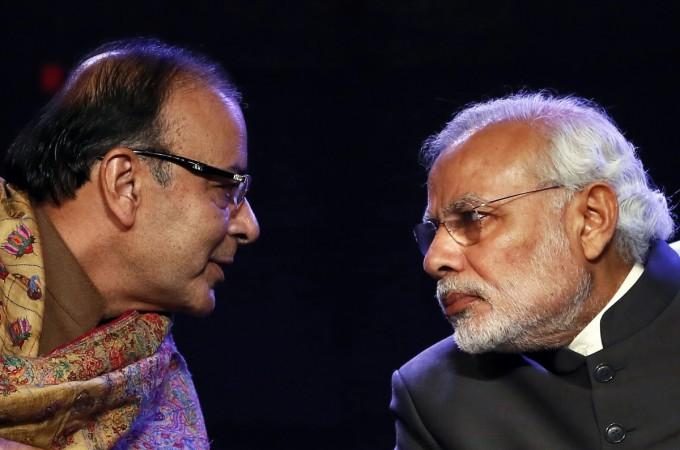
A Narendra Modi government exercise lowering the economic growth rate numbers for the years when Congress-led alliance was in office has sparked a major row.
Recalibrating the data using 2011-12 as the base year instead of the earlier used 2004-05, the Central Statistics Office (CSO) estimated that India's GDP grew by 8.5 per cent in the 2010-11 financial year, and not at 10.3 per cent as previously estimated.
The 9.3 per cent growth rate in 2005-06 and 2006-07 was similarly pegged down to 7.9 per cent and 8.1 per cent respectively. The growth rate for 2007-08 was estimated at 7.7 per cent instead of the previous 9.8 per cent, media reports said.
The government on Wednesday lowered the country's economic growth rate wiping out more than 1 percentage point from the only year when India posted double-digit GDP growth and from each of the three years with 9-plus percentage expansion.
The CSO also lowered the GDP growth rate for 2008-09 when the world witnessed a global financial crisis to 3.1 per cent from 3.9 per cent. For the following fiscal, the same was revised to 7.9 per cent from 8.5 per cent and for 2011-12, the growth was lowered to 5.2 per cent from 6.6 per cent.
The government moved to the new base year of 2011-12 from the earlier 2004-05 for national accounts in January 2015. The previous revision in the base year was in January 2010.
Meanwhile, the main opposition Congress party has accused the Modi government of "manipulating" GDP data of previous years and said it reflected a desperate attempt to undermine India's growth story over the last 15 years.
"The entire GDP back series data released today reflects the desperate attempt of a defeatist Modi government to undermine India's growth story over the last 15 years. The Modi government and its puppet Niti Aayog want the people to believe that 2+2=8," Congress chief spokesperson Randeep Surjewala stated. "Such is the gimmickry, jugglery, trickery and chicanery being sold as 'back series data'," he said in a statement.
The revised growth numbers assume significance in view of the 2019 general elections.
Certain sectors
At a joint press conference along with Chief Statistician Pravin Srivastava, Niti Aayog Vice-Chairman Rajiv Kumar said the variation in the two sets of numbers was due to the recalibration of data in certain sectors of the economy, including mining, quarrying and telecom, a news report said.
"A complex exercise has been carried out by the Ministry of Statistics and Programme Implementation to update the National Accounts Series. The new series has made significant methodological improvements," Kumar claimed.
He added that the New Series, with its supporting back series, is "internationally comparable and is in sync with UN Standard National Account."
When asked if it is a coincidence that GDP numbers have been revised downwards only for the UPA period, Kumar replied in the negative.
"No, it was not a coincidence. It was a matter of hard work done by the CSO officials who had taken the pain to do all the recalibration of the economy that they have done," he said, adding, the methodology adopted has been vetted by leading statisticians.
Kumar said the government has no intention to "mislead or try and do something purposefully" which does not reflect the reality.
Faster pace
However, some reports point out that the new data contravened a report of the National Statistical Commission (NSC), the autonomous body that helps in the collection of data by India's statistical agencies, in August.
That report showed the economy grew at a faster pace under Manmohan Singh-led United Progressive Alliance (UPA) government from 2004-05 to 2013-14, compared with the average growth during the first four years of the current government.
It estimated the GDP growth at 10.08 per cent in 2006-07, the highest since the 1991 economic liberalisation. Incidentally, the highest growth since the Independence was in 1988-89 at 10.2 per cent when Rajiv Gandhi was the prime minister.
The committee's report has not been accepted and Kumar said the methodology adopted by them was flawed. Finance Minister Arun Jaitley has defended the government's adoption of a new base year.
















